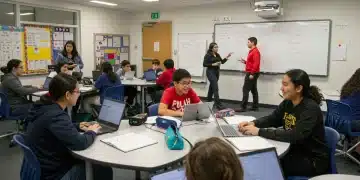Scene special education law: understanding your rights

Special education law ensures that children with disabilities receive a Free Appropriate Public Education (FAPE), access to individualized services, and the right to actively participate in their educational decisions.
Scene special education law plays a crucial role in ensuring that children with disabilities receive the education they deserve. But do you know how these laws affect your family? In this article, we’ll delve into the essential rights and protections available to students with special needs.
What is special education law?
Special education law refers to a set of federal and state laws that ensure students with disabilities receive the education they deserve. Understanding these laws is essential for parents, educators, and advocates to protect students’ rights.
One key aspect is the Individuals with Disabilities Education Act (IDEA), which ensures children with disabilities have access to a free appropriate public education (FAPE). This law mandates that schools develop an Individualized Education Program (IEP) tailored to each student’s unique needs.
Types of Disabilities Covered
Special education law covers a range of disabilities, including:
- Autism Spectrum Disorder
- Emotional Disturbance
- Specific Learning Disabilities
- Speech and Language Impairments
Each child is different, and the law recognizes this diversity. The law supports the idea that every child can learn and succeed, regardless of their disabilities. Additionally, it promotes an inclusive environment where students can learn alongside their peers.
Key Rights Under Special Education Law
Students with disabilities have several rights, including:
- The right to an appropriate education tailored to their needs.
- The ability to participate in extracurricular activities.
- The right to receive support services as outlined in their IEP.
- The right to be informed about their educational rights.
Navigating these laws can be challenging, but understanding them empowers families and advocates to ensure that students receive the support they need. With the right knowledge, you can help ensure that special education laws are properly implemented in schools.
The impact of special education law can be profound, offering hope and resources for students and their families. When schools adhere to these laws, they contribute to a more equitable education system where all students have the opportunity to thrive.
Key rights under special education law
Understanding the key rights under special education law is crucial for ensuring that students with disabilities receive the education they deserve. Parents and educators should be aware of these rights to advocate effectively for students’ needs.
One of the most vital rights is the right to a Free Appropriate Public Education (FAPE). This means that schools must provide special education services tailored to a student’s individual needs without charging for them. Additionally, students have the right to participate in activities alongside their peers.
Individualized Education Programs (IEP)
Every child covered under special education law is entitled to an Individualized Education Program (IEP). This program outlines:
- The specific educational goals for the student.
- The services and supports the school will provide.
- How progress will be measured.
- The timeline for achieving these goals.
With an IEP, parents and educators work together to develop a personalized plan that supports the child’s growth and learning.
Additional Rights
Aside from the IEP, several other rights are critical for students under special education law:
- The right to be assessed fairly and without discrimination.
- The right to participate in the decision-making process regarding their education.
- The right to access educational resources and facilities.
- The right to receive services in the least restrictive environment possible.
These rights ensure that students with disabilities are treated fairly and have the same opportunities as their peers. By knowing these rights, families can better advocate for their children and ensure they receive the education they are entitled to.
How to advocate for your child

Knowing how to advocate for your child is essential, especially when it comes to navigating the complexities of special education law. Parents can play a critical role in ensuring that their child’s rights are respected and upheld in the educational system.
One effective strategy is to build strong relationships with educators and school administrators. Regular communication helps parents stay informed about their child’s progress and any challenges they might face. Attending school meetings and being present during IEP discussions can help parents voice their concerns and suggestions effectively.
Understand Your Child’s Rights
Being knowledgeable about your child’s rights under the law is crucial. Familiarize yourself with special education laws such as the Individuals with Disabilities Education Act (IDEA). This includes understanding:
- The right to a Free Appropriate Public Education (FAPE).
- The process for developing an Individualized Education Program (IEP).
- The services your child should receive.
- The right to participate in decisions affecting your child’s education.
Knowledge empowers parents to speak up when necessary and ensure their child gets the support needed for academic success.
Building a Support Network
Parents can also benefit from connecting with other families facing similar challenges. Joining support groups or online forums can provide valuable insights and resources. Sharing experiences empowers parents and allows them to learn from each other.
Finally, having an advocate or attorney specializing in special education law can provide additional support. Professionals can help ensure that parents’ voices are heard and that families receive the necessary services.
Advocacy is an ongoing process. Regularly monitor your child’s progress and continue dialogues with the school. By being proactive and informed, parents can create positive outcomes for their children’s education.
Common challenges in special education
When navigating the world of special education, families often face several challenges. Understanding these common issues can help parents and educators work together more effectively to find solutions.
One major challenge is the lack of resources in schools. Many districts struggle with limited funding, which can affect the availability of support staff and specialized services. Parents may find it difficult to secure the necessary resources for their child, making advocacy all the more vital.
Difficulties with Communication
Another common issue is the difficulty in communication between parents and school staff. Parents may feel hesitant to voice their concerns about their child’s education, while educators may not fully understand the unique needs of students. Effective communication is key to ensuring everyone is on the same page and working together toward the child’s success.
Understanding Legal Rights
Many families find it challenging to understand their child’s legal rights under special education law. Confusion may arise surrounding the IEP process, eligibility criteria, and how to dispute decisions made by the school. This knowledge is crucial for parents to support and advocate for their children.
- Parents need to be aware of timelines for evaluations and services.
- Understanding procedural safeguards can help in resolving conflicts.
- Having access to clear information about the law is essential.
Additionally, parents may face emotional challenges as they navigate their child’s journey. The stress of advocating for proper services, coupled with the emotional toll of seeing their child struggle, can be overwhelming. Finding support groups or communities can provide crucial help and encouragement.
Finally, cultural and linguistic barriers can create difficulties in accessing special education services. Families from diverse backgrounds might struggle to communicate their needs or understand the processes involved, making it essential for schools to offer resources in multiple languages and formats.
Resources for families navigating the law
For families navigating special education law, having access to the right resources can make a significant difference. Understanding where to turn for help is crucial in ensuring that children receive the education and support they need.
One valuable resource is advocacy organizations that specialize in special education. These groups provide information, guidance, and support to families. They can assist with understanding the laws and the rights of students, as well as offer workshops and training sessions for parents.
Online Resources
The internet is a fantastic place to find helpful information. Websites like the National Center for Learning Disabilities and the Individuals with Disabilities Education Act (IDEA) site offer a wealth of resources. Families can explore:
- Articles on special education rights and responsibilities.
- Sample IEP forms and templates.
- Webinars and training resources.
- Networking opportunities with other parents.
These resources support parents in becoming effective advocates for their children and understanding the IEP process.
Local Support Groups
Connecting with local support groups is also beneficial for families. These groups allow parents to share experiences, feelings, and strategies for advocating for their children. Local chapter meetings often feature guest speakers who are experts in special education laws, providing valuable insights and advice.
Additionally, some schools may offer workshops or seminars on navigating special education services. Participating in these events can help parents feel more equipped to work with school staff and address any challenges that arise.
Finally, seeking legal advice from lawyers who specialize in education law can be invaluable. These professionals can clarify legal issues, assist with disputes, and ensure that families fully understand their rights under the law.
FAQ – Frequently Asked Questions about Special Education Advocacy
What rights do children have under special education law?
Children have the right to a Free Appropriate Public Education (FAPE), access to necessary services, and participation in the decision-making process about their education.
How can I effectively advocate for my child in school?
Building strong relationships with educators, knowing your child’s rights, and maintaining open communication are key strategies for effective advocacy.
Where can I find resources related to special education laws?
Online resources, advocacy organizations, and local support groups provide valuable materials and assistance to families navigating special education.
What should I do if I face challenges in securing services for my child?
If you encounter barriers, consider reaching out to advocacy organizations, joining support groups, or seeking legal advice from professionals specializing in education law.





